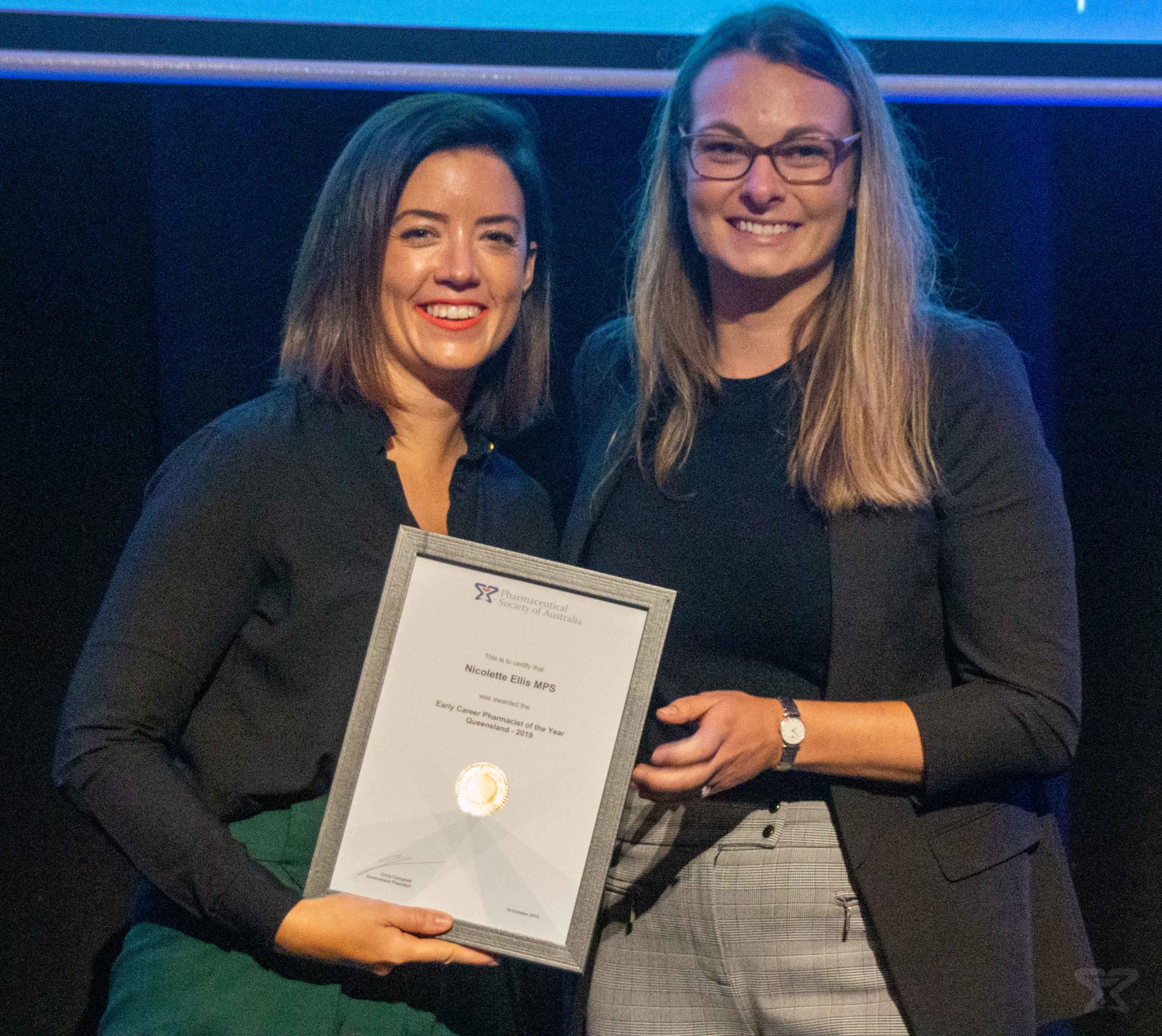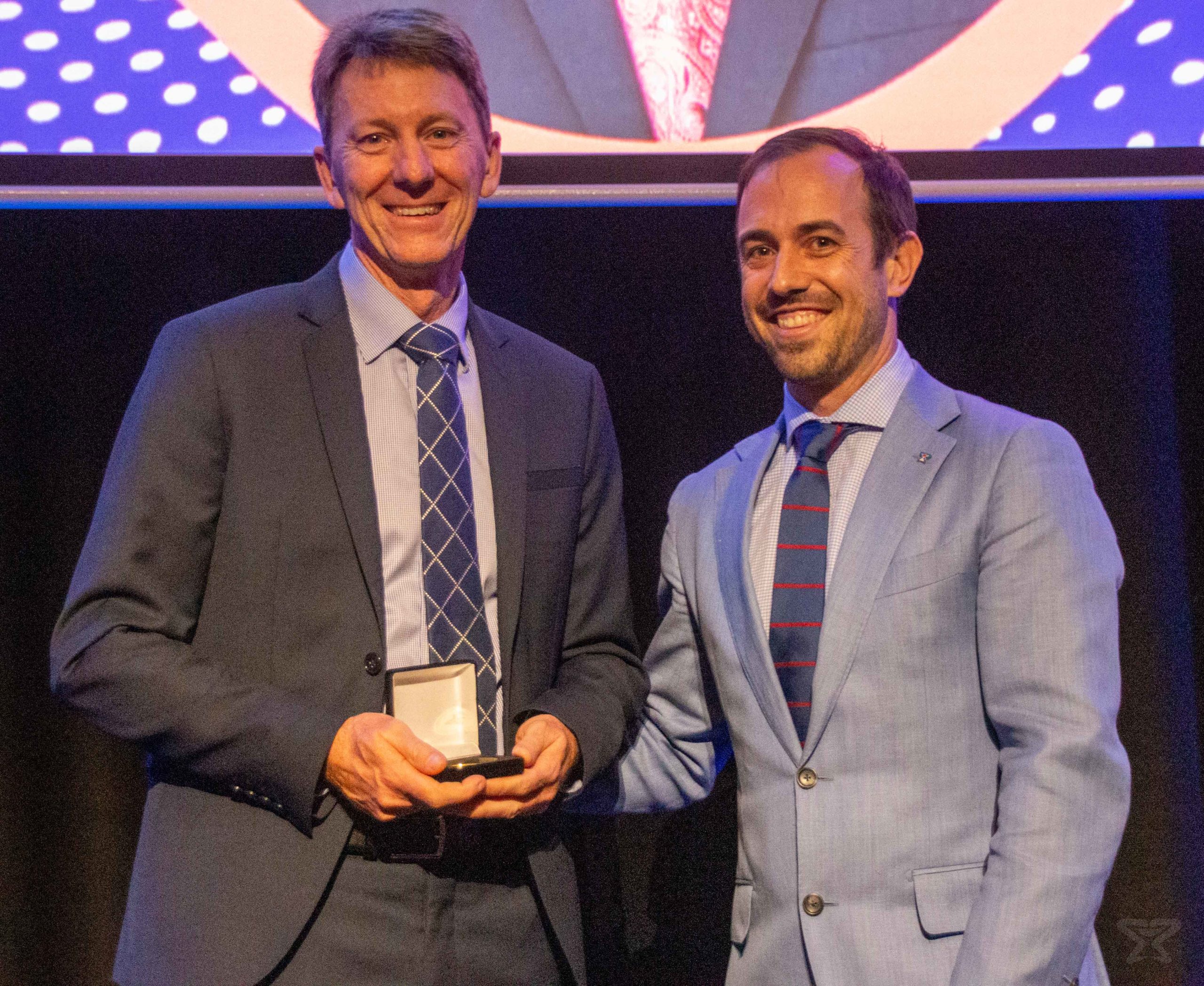Leading local Victorian pharmacists honoured
22/11/2019
The three Victorian pharmacists honoured at last night’s Victorian Pharmacists Dinner represent not only the breadth of opportunities and experiences offered by a career in pharmacy, but the difference dedicated members of the profession make every day to health care in our community.
At last night’s ceremony, Roslyn Stewart from Broadford was awarded the Victorian Pharmacist Medal; Brighton’s Kay Dunkley received the Victorian Excellence Award, and Dr Amanda Cross of Albanvale was named Early Career Pharmacist of the Year.
Each of the award recipients have dedicated their careers to caring for those in the community most in need.
“Between them, Roslyn, Kay and Amanda have achieved excellence in areas of practice ranging from research and tertiary care to community pharmacy and aged care,” Pharmaceutical Society of Australia Victorian President, Ben Marchant said.
“During the more than 20 years Kay has committed to caring for patients, she has also been a leader in ensuring the health and wellbeing of her peers.
“While Amanda is still in the early years of her career as a pharmacist, she has already had a significant impact on medicine safety in Victoria, particularly in terms of protecting older people with cognitive impairment from medicine errors.”
“During Roslyn’s working life, she has helped advance the optimisation and standardisation of treatment regimens and been committed to improving mental health care.”
Victorian Excellence Award winner, Kay Dunkley has had a long-term involvement with the Pharmacists’ Support Service (PSS). She explains that: “PSS is about caring for each other within the pharmacy profession to ensure that as a profession we can care for the Australian community. I really value the generosity of the PSS volunteers in giving their time and energy to be there for their colleagues in times of stress.”
A highlight of Kay’s work has been “being able to make a difference to the lives of those we care for as pharmacists.”
In terms of being honoured for her contribution to health care in Victoria, Kay is quick to remember those who have been there for her. “I attribute this recognition to the various people who have influenced me throughout my career. It is always wonderful when someone you respect encourages and supports you.”
Reflecting on the path that brought her to pharmacy, Victorian Pharmacist Medal recipient, Roslyn Stewart goes back to her school holidays on her grandparents’ farm. “Each week we would take a trip into town and would always visit their friend, the local pharmacist at his shop. Over the years it © Pharmaceutical Society of Australia Ltd. I 2 became apparent to me what an important contribution he made to the wellbeing of the local community.”
For Roslyn, a career as a pharmacist has offered a diversity of options. “I have taken advantage of this, working in research, hospital and community pharmacy and have been conducting medication reviews in aged care facilities and in the community for over 20 years. I have enjoyed each new challenge. Few careers provide this type of flexibility.”
Volunteering is in Roslyn’s blood and being a Mental Health First Aid Instructor is just one way she gives back to the community. “People are not generally well informed about mental health issues in the rural areas and there are few services available to get help. Being trained as a MHFA has improved my listening skills and ability to counsel people experiencing mental health issues.
“Being recognised with this award has made to realise that through my work as a pharmacist I have made a difference and this gives me enormous satisfaction.”
Dr Amanda Cross, the inaugural Victorian Early Career Pharmacist of the Year, loves being a pharmacist, particularly being able to advance the profession and help people. Her focus on medication safety stems from her work as a community pharmacist and home medication review pharmacist.
“I would frequently see patients struggling with medicine adherence and commonly using inappropriate medicines. While I was able to help individual patients, I chose to do a PhD to try to make a difference on a larger scale.
“Medicine safety is important to me because as a pharmacist it is my responsibility to ensure people are taking the right medicines, at the right dose for the right duration to ensure the medicine is creating more benefit than harm.
If Amanda could give one message to other early career pharmacists it would be: “stand up and fight for the change you want to see in the world around you. If you want to improve the health of your patients, make a change in your community or expand the scope of pharmacy practice – find a way, even if it means following a non-traditional path.
Mr Marchant praised, “All three award winners do themselves and their profession proud and are exceptionally worthy recipients.”
Media contact: Stefanie Johnston, PSA Victoria – 0417 910 738
Download the media release here
2019 PSA Victoria Awards Winners – profiles

Kay Dunkley, Victorian Excellence Award
Kay Dunkley has worked in hospital and organisational pharmacy for over 20 years as well as conducting medication reviews in aged care and in the community.
Kay has a strong interest in the health and well-being of health professionals and especially the role of peer support. Kay has a long-term involvement with the Pharmacists’ Support Service, a group which has been providing telephone support for pharmacists in Victoria since 1995. In 2005, Kay became the Program Coordinator for the Pharmacists’ Support Service and has assisted the service to become an independent organisation which has expanded to provide support to pharmacists, interns and students throughout Australia. She has also helped develop a similar service for the medical profession in Victoria.
Kay currently coordinates both the Pharmacists’ Support Services and AMA Victoria Peer Support Service.
Until recently, Kay was also working part-time as a consultant pharmacist in Residential Aged Care Facilities and private homes.

Roslyn Stewart, Victorian Pharmacist Medal
Roslyn’s career has spanned over 40 years and included both clinical and community pharmacy.
Her first position was as a relieving pharmacist in Victorian country hospitals. From 1979-85 in her position of Senior Pharmacist in the Department of Clinical Pharmacology and Therapeutics at the Royal Melbourne Hospital she conducted drug audits. One of these was on antibiotic usage and the results from this were the impetus for the development of the Antibiotic Guidelines, the first of the many Therapeutic Guidelines booklets. These guidelines have been a major advancement in optimising and standardising treatment regimens.
For the past 20 years Roslyn has worked in community pharmacy.
She is a trained Mental Health First Aid (MHFA) Instructor and teaches Standard MHFA, Older Persons MHFA and MHFA for Suicidal Thoughts on a volunteer basis for Mitchell Suicide Prevention Network because she believes that education about mental health issues empowers people to reach out to those in need and reduces stigma.
Over the past few years Roslyn has been marking assignments for the medication review component of the Monash Postgraduate Studies in Clinical Pharmacy Practice.

Amanda Cross, Early Career Pharmacist of the Year
Amanda has worked across a diverse range of traditional and non-traditional roles. Amanda has been passionately involved with the PSA for many years, at the state level as Victorian Branch Vice President and on the Victorian and national Early Career Pharmacists (ECP) working groups.
In 2019 Amanda completed her PhD focused on the prevalence and impact of potentially inappropriate medication use in older people with cognitive impairment. Amanda is a talented early career researcher with a strong track record including eight peer reviewed research papers and 13 conference presentations, both national and international. She has also been recognised through multiple awards, including winning the 2018 Monash Faculty of Pharmacy Three Minute Thesis competition and received grant funding from the Victorian Therapeutic Advisory Group to conduct a medication safety study in older people with memory impairment.
Amanda is currently undertaking postdoctoral research as the only pharmacist in a team of allied health researchers at the Monash Department of Clinical Epidemiology, Cabrini Institute. Amanda’s current projects include examining barriers and enablers to deprescribing opioids to inform development of future interventions to reduce the inappropriate use of opioids for chronic non-cancer pain. She is also working with the Australian Commission on Safety and Quality in Health Care to implement the Osteoarthritis of the Knee Clinical Care Standards.
Amanda also works as an independent accredited HMR pharmacist and provides teaching and support to undergraduate students and supervising registered pharmacists to conduct a HMR as part of their journey towards accreditation.




